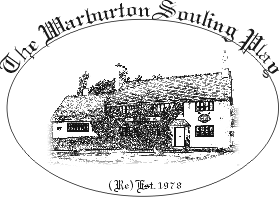|

|
A guide
to what a Souling Play is together with in introduction to the
Warburton play |
|---|
What is a Souling Play? Well, in its simplest description it is a play of death and revival and is closely related to the more common Mumming Play. However, it is very much a Cheshire tradition and, unlike the Mumming Play that is performed at Christmas, the Souling Play is performed at the beginning of November. In some cases the 31st October was the performance day and in others including the Warburton play it is the 1st November, yet others were thought to be on All Souls Day itself, the 2nd November.
Another distinctive feature of these Cheshire plays is the inclusion of a Horse character. This is normally a decorated horse's scull and is not to be confused with the Hobby Horse to be found in other English traditions and reputedly of Pagan origin. The reason for its inclusion is not fully understood, however, the theories vary and maybe nothing more than the simple fact of it being a representation of the source of power for the many tasks of life in times past or as a representation of the Cheshire hunting traditions.
The timing of the play may also be related to the old Celtic year although again much is in dispute.
Although its likely the plays were very much handed down by word of mouth in later years, there is good chance that most plays of this nature owe their origins to a series of small pamphlets known as Chapbooks. These were published from the mid 18th Century up until the first year of the 20th Century and seem to have all the elements of the 'traditional' plays of this nature.
As well as the traditional core to the play the participants would also have followed topical happenings of the day. As communication would have been very slow, no where near the 'one day trend' of today's hyper age these 'topical' aspects would have lasted many tens of years or perhaps until somebody simply forgot the line or replaced it with something else, and so the plays would have developed very slowly.
It's also likely that the plays were performed by the poorer members of the community and at the end of the play there was, for want of a better description, a begging song with the hope of food or other such commodities to help the performers through the winter. In some plays it is thought the gang would go out with cakes with the intention of selling them so in this case some of the plays in the Souling tradition are called Soul-Caking. The Warburton play is reported to be one of a group where apples were requested following the performance so in this case it is a Soul-Appling play.
The song at the end of the Warburton play makes reference to "put your hand in your pocket and pull out your purse", and the opening song contains a request for Ale. This again is in keeping with the evolution of the plays as they went through a phase of being performed in the farms and large houses of the area and later drifting towards being performed in the local Ale Houses.
At one point, at the end of the 19th Century there would have been thousands of traditional plays being performed up and down the country and quite likely many 10s of Souling plays in Cheshire. However the start of the 20th Century saw many losses of such plays due to changing times and more specifically due to two world wars. The Warburton play was such a victim being last performed in 1936. However it was very fortunate in being collected and written down before being subsequently published.
In our evolution the Saracens Head in Warburton is very much the home of the Play with the first performance of each year being there and once the season is complete the last performance was there. The Warburton Play is reported to have been performed on the first 4 nights of November ending in a Supper at the Saracens Head. There is some confusion as to the 4 nights, as it is also stated as starting on the 1st and ending on the 5th. It is likely this is to do with the Play not being performed on a Sunday. It might well have been performed over 5 nights if a Sunday fell between the 1st to the 4th as an extra night, the 5th, could well have been performed.
Another interesting factor is the tradition relating to the starting and finishing at the Saracens Head. There are other references to plays, Higher Whitley for instance, where the horse's head was buried in the pub grounds and retrieved prior to the start of each year and buried again following the final performance. In the collected reference to the Warburton play there was a note that the horse's head was buried in the grounds of the Saracens Head at the end of the last performance. The original interpretation was that the Gang of the day knew that they had just performed the play for the last time before its abandonment and so decided to bury the head. However we now believe the burying of the head was 'the norm' and they were thus burying it until the following season.
For those wishing to
understand more of traditional drama in the UK and worldwide there are
two sources of further reading . The first
is the Traditional
Drama Research Group
and the second is Master Mummers.
This page updated: 31st March 2008.